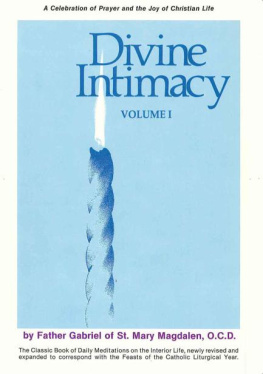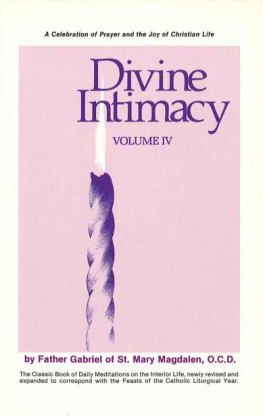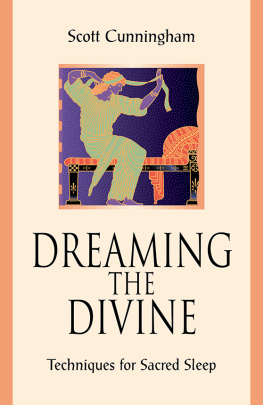FATHER GABRIEL OF ST. MARY MAGDALEN, O.C.D.
DIVINE INTIMACY
Volume III
Ninth Sunday through
Twenty-first Week of Ordinary Time
IGNATIUS PRESS SAN FRANCISCO
This enlarged and revised edition was
previously published by Dimension Books, Inc.
Translated from the Sixteenth Italian Edition
Carmelite Monastery of Pittsford, N.Y.
With ecclesiastical approval
Carmelite Monastery, Pittsford, N.Y. 14534
All rights reserved
Reprinted with permission of Dimension Books, 1987
ISBN 9780898701449
Library of Congress catalogue number 86-83132
Printed in the United States of America
Meditation
year A
year B
year C
year A
year B
year C
year A
year B
year C
year A
year B
year C
year A
year B
year C
year A
year B
year C
year A
year B
year C
year A
year B
year C
year A
year B
year C
year A
year B
year C
year A
year B
year C
year A
year B
year C
year A
year B
year C
year A
year B
year C
year A
year B
year C
year A
year B
year C
206. NINTH SUNDAY OF ORDINARY TIME
YEAR A
Be my rock of refuge, a strong fortress to save me (Ps 31:2)
I set before you this day a blessing and a curse: the blessing if you obey the commandments of the Lord your God;... the curse if you do not obey (Dt 11:26-28). Israels whole perfection was contained in the law and was expressed in its observance. God blessed and cursed man according to whether he obeyed or disobeyed the law. The New Testament established a new order: God blesses and therefore saves man, not for keeping the old law, which is now no longer in force, but through faith in Christ the Savior. St. Paul strongly supports this: But now the righteousness of God has been manifested apart from the law... the righteousness of God through faith in Jesus Christ for all who believe (Rom 3:21-22). This is a great change: Jews who faithfully observe the Mosaic law have no greater right to salvation than those who are ignorant of this law; for both the one and the other, salvation is a free gift offered by Gods infinite goodness to all those who believe in Jesus Christ. Likewise we read in Johns Gospel... that whoever believes in him may have eternal life (3:15). And St. Paul states specifically: For we hold that a man is justified by faith apart from works of the law (Rom 3:28). It must be understood, however, that the works which are excluded are only those of the Mosaic law, not the good works which are the fruit of faith in Christ. For, indeed, the same Apostle explains elsewhere that for salvation, all that counts is faith working through love (Gal 5:6), that is, faith which is not just an adherence of the intellect to Christ, but an adherence of the whole person: intellect and will, thought and works.
This is exactly what Jesus was teaching when he declared Not everyone who says to me, Lord, Lord shall enter the kingdom of heaven, but he who does the will of my Father who is in heaven (Mt 7:21). Faith must encompass the whole of life, and lead, not to a simple abstract recognition of Gods existence, but to a practical acknowledgement which brings with it the submission of our own will to Gods, and behavior that is regulated by his commandments. Therefore those who reduce their profession of faith to prayer, to the apostolate, or even to the simple practice of the ministrydid we not prophesy in your name and cast out demons... (ib. 22)but who do not extend it to every sector of personal life through accomplishing Gods will, will one day hear him say: I never knew you (ib. 23). Only faith which is made concrete in full adherence to the will of God enables us to build our house upon rock, without fear that it will be knocked down by winds or storm. This house is Christian life, which, founded on faith in Christ and on carrying out his words, can defy any hurricane and even time and death as they change at last into eternal life.
The soul of the just yields to no temptation, because it rests upon rock, that is upon the firmness and stability of your teaching, O Lord Jesus. Indeed your precepts are more solid than rock. Any one who practices them is raised above all the unexpected disasters of this world. What happier situation in life can there be than this? Neither wealth, nor physical strength, nor glory, nor power, nor any other privilege can secure for us an interior steadiness like this. Only the possession of virtue can make all this possible... O Lord, you spur me on to virtue, not only by the promise of future realities by making me remember the kingdom of heaven, with all the inexpressible rewards and consolations and other endless blessings to be enjoyed there, but also by showing me the unshakeable steadiness and stability which virtue confers upon me in this life. St. John Chrysostom, Commentary upon Gospel of St. Matthew 24:2-3 O Jesus, with a strong faith I get as near you as I can, in order to know God in you and through you, and to know him in a manner that is worthy of God, that is in a way that makes me love and obey him, according to what your beloved disciple says: He who says I know him, but disobeys his commandments is a liar; and you yourself said: If you love me, keep my commandments . So my whole reason for wanting to know you is to love you; and I want to know and love you in order to force myself to do your will, for I am convinced that I will not be able to know you well except by being united to you by a love that is pure and chaste.... May the light of faith enlighten and guide me so that I may succeed in loving you, since it is really through faith, according to St. Paul, that we work and act out of love .cf J.B. Bossuet, Elevations
YEAR B
Let us sing aloud to God our strength; shout for joy to our God (Ps 81:2)
Keeping holy the Lords day holds a special place in Sacred Scripture. We read in Deuteronomy: Observe the sabbath day to keep it holy as the Lord your God commanded you. Six days you shall labor and do all your work; but the seventh day is the sabbath to the Lord, your God (5:12-14). To keep holy the sabbath means to separate it, distinguish it from the other days to devote it to God. Further on (ib. 15), the sacred text suggests how this is to be done: by remembering Gods great favors to his people, among which the passover holds first place, for it was their liberation from slavery in Egypt. Remembering this should lead them to thanksgiving and to a renewal of their promise of loyalty to God.
In the New Testament, the old passover is replaced by the new: Christs paschal mystery; the old sabbath, Saturday, yields place to Sunday, the blessed day of the resurrection. For the Christian the Lords day is meant to be a memorial of the pasch of Jesus, the mystery of love and salvation, the center and supreme act of worship. Abstaining from daily labor does not suffice to fulfill the precept of keeping this day holy; that is simply a preliminary step to free us from the bustle of everyday life so that we can engage more easily in dialogue with God, recall his love and favors, rekindle our desire and hope for eternal blessings, strengthen our soul by meditation on the divine word, and catch our breath again on the road to our heavenly homeland. When Sunday loses this religious meaning it is no longer the Lords day, but frequently becomes the day on which men give free rein to pleasure; or the feastday rest may be reduced to a petty formalism as had happened with the Jewish sabbath.
In thus renewing the old law, Jesus affirmed his authority in regard to the sabbath. When the disciples had gathered and husked corn on the sabbath to satisfy their hunger, Jesus defended them, saying: The sabbath was made for man, not man for the sabbath (Mk 2:27). Its purpose is especially mans spiritual benefit, attained through a more intense relationship with God in acts of worship which are not only individual but communitarian; and also his material welfare by its procuring him justified repose and giving him time for works of charity on behalf of his neighbor. By declaring himself Lord of the sabbath (ib. 28), Jesus freed the sabbath from the narrow interpretations of the Pharisees; at the same time he admonished his disciples to use it with suitable freedom, but always in conformity with his teaching and example. In fact he did not hesitate on the sabbath itself to cure the man who had a withered hand (Mk 3:1). He did it in spite of the malevolent attitude of the Pharisees in order to demonstrate that not only is it lawful to do a good deed on the sabbath (ib. 4), but that good deeds for the relief of our suffering brethren should complete the sanctification of the Lords day.
Next page











